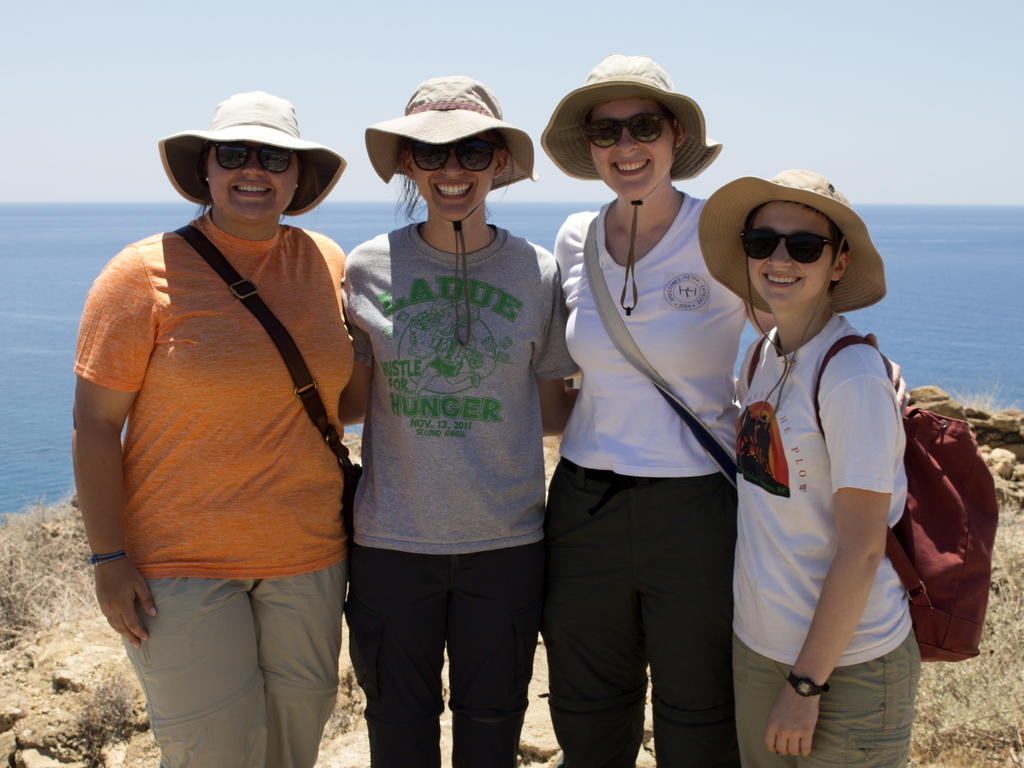Students at Rhodes College know how integral ancient Greek and Roman culture is to the Western world—just ask anyone who has taken a Search course. This past summer, four students who studied these cultures in their first semesters at Rhodes got a chance to accompany Dr. Miriam Clinton of the Department of Art and Art History to Crete, home of the Minoan civilization and the largest of the Greek islands, to conduct archaeological research. Clinton and her colleagues, Dr. Andrew Koh of Brandeis University and Dr. Georgia Floudia of the Archaeological Museum of Harklion, are the first archaeologists in more than a century to be granted permission to study the Mouliana Sellades “Warrior Graves.” Clinton and Koh, whose research focuses on the Bronze Age, had previously relied on these same “Warrior Graves” to predict new archaeological sites on Crete using terrain models in GIS, and then confirmed their presence using Google Earth.
Clare Misko ’17 and Alexandra Howell ’17 first assisted by analyzing artifacts from tombs found on the island. Working with specialists from the Archaeological Museum of Heraklion and Sitia Archaeological Museum, they employed technology such as photogrammetry and organic residue analysis to understand the objects in the tombs and answer more general questions about the Minoan period. Misko and Howell were then joined by Erica Smythe '17 and Kayce Boehm '19, to help excavate a cemetery dating back to the Bronze Age. The team used various digital and hand drawing methods to create accurate records of the architecture of the cemetery in the form of a digital map.
“I think the most difficult aspect of our trip was the pretty steep learning curve,” says Howell. “Some of the tools take a fair amount of practice before you can come anywhere close to being proficient.”
On top of working with advanced research methods, the students were completely immersed in a foreign culture, making the process even more challenging. “The cultural enrichment was really what made the experience exceptional,” says Smythe. Misko adds that the language barriers provided a challenge, but helped her broaden her cultural horizons. “Upon landing in Crete, I realized that not only could I not speak Greek, but I had no idea how to read the simplest sign or even to recognize the letters of the Greek alphabet, which was very humbling.”
Although most of the students hadn’t definitely decided on pursuing a career path in art history prior to their trip to Crete, they soon discovered that the experience would be helpful for any professional route they might choose.
"I don’t have a clue as to what I would like to do with my life yet. But this opportunity and the chance to speak with several graduate students on the project helped me feel out what a career in the archaeological or art history world might look like,” says Misko. “Essentially, I realize how many options I have.”
Howell and Smythe say that the research experience they got in Crete this past summer solidified their passion for the field. “I think this opportunity was crucial to my future career. It helped me confirm that despite the incredible amount of hard work necessary to succeed in this field, this is truly what I want to do,” says Howell.
Boehm, though undecided on a major, found her experience in Crete both culturally informative and influential in helping her think about a career for her future. “I am still testing my strengths to see what career I might be suited for, but this trip gave me first-hand experience of an archaeological excavation and what it’s like to see another part of the world,” she says. “I am a more complete person because of it, and this is valuable for any career I chose to pursue.”
“I think the whole experience was completely enriched by the way Professor Clinton led it,” adds Misko. “She set the tone by example: working hard, but making sure we were taken care of. She was incredibly generous in sharing her wealth of knowledge with us.”
All four students are eager to apply their experiences from the past summer to classes and jobs in the future. “I wouldn’t have as many opportunities to explore my passion at any other school,” says Smythe. “Getting to know Professor Clinton, Alex, Kayce, and Clare over the course of six weeks is an experience I’ll never forget.”
Clinton plans to continue her archaeological work on Crete for the foreseeable future, and hopes more students will be interested in joining her there for a Maymester next summer.
For more information on the dig, visit the Mouliana Project blog.
By Katherine Hancock '19
